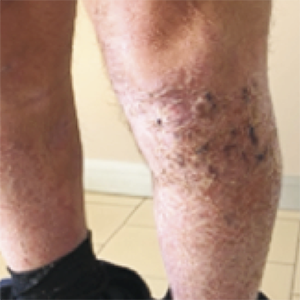Long term efficacy, safety, and tolerability of tildrakizumab in epileptic patient with psoriasis and eczema

All claims expressed in this article are solely those of the authors and do not necessarily represent those of their affiliated organizations, or those of the publisher, the editors and the reviewers. Any product that may be evaluated in this article or claim that may be made by its manufacturer is not guaranteed or endorsed by the publisher.
Authors
Psoriasis is a chronic inflammatory disease which mostly affects skin. Tildrakizumab is a specific anti-interleukin-23p19 monoclonal antibody approved for the treatment of plaque psoriasis in adults. Herein, we report about a patient who came to our attention for a moderate-to-severe plaque psoriasis, involving primarily upper limbs, elbow, abdomen and knees (PASI 18 – DLQI 22). His medical history was relevant for epilepsy controlled pharmacologically. In addition, an eczematous and edematous appearance of the tibial area was detected; the histologic findings did not contradict the diagnostic hypothesis of subacute spongiotic dermatitis. The patient was treated with Tildrakizumab. After 12 weeks the clinical lesions improved significantly, and the eczematous component disappeared in the tibial area bilaterally. The clinical improvement was maintained even after one year of therapy. Tildrakizumab showed excellent results in the control of psoriasis, with an excellent safety profile. The promising results of clinical trials have been confirmed in a real-life setting. There are no reports about its safety in epileptic patients. In our case, neurological adverse events did not verify and tildrakizumab managed to control both the psoriatic and eczematous components
How to Cite

This work is licensed under a Creative Commons Attribution-NonCommercial 4.0 International License.








